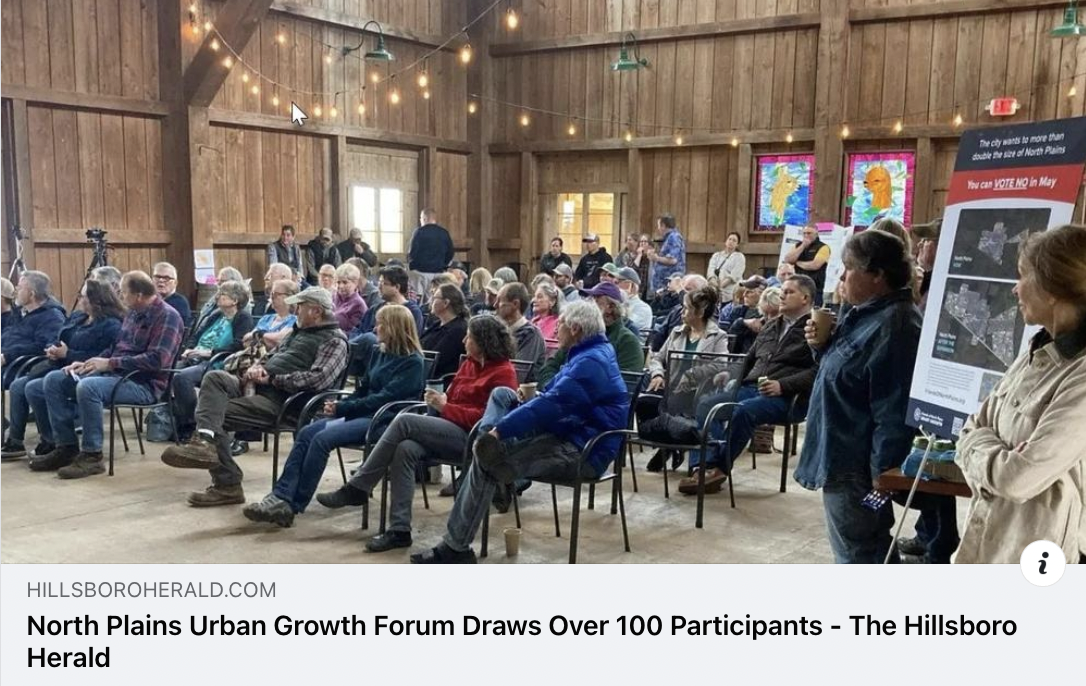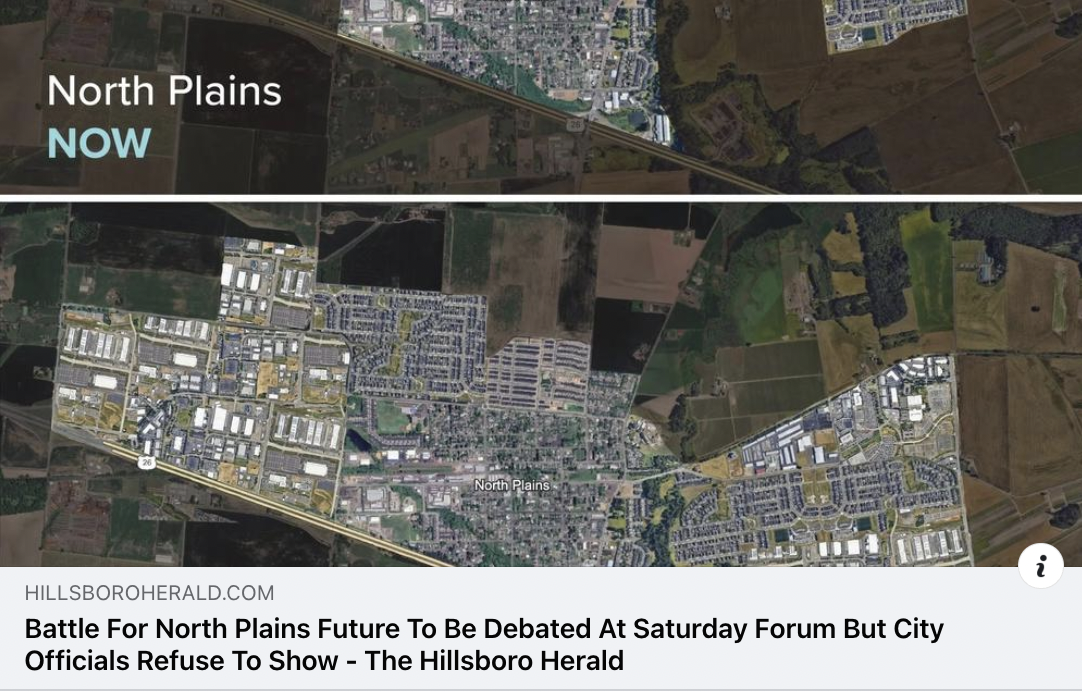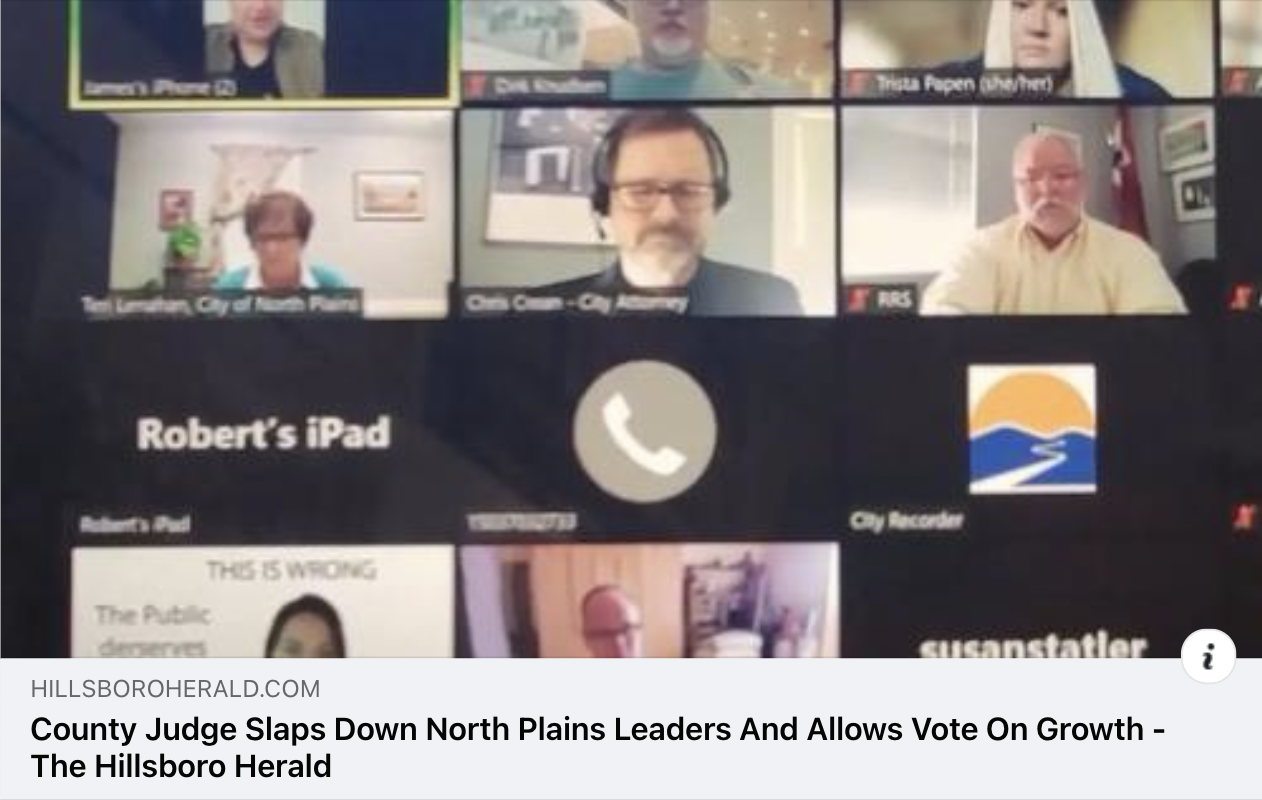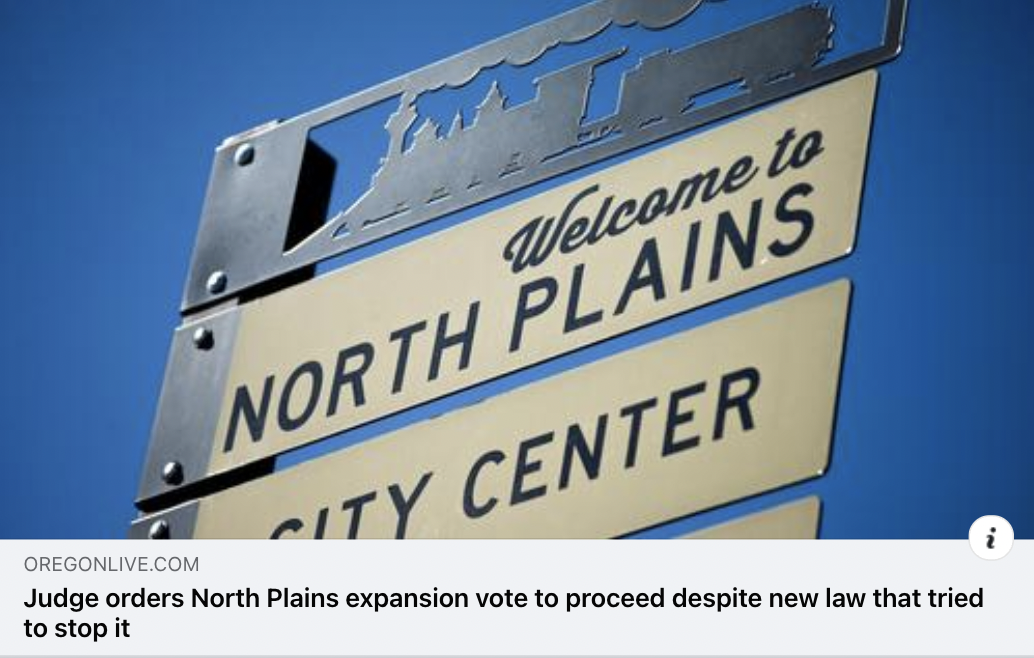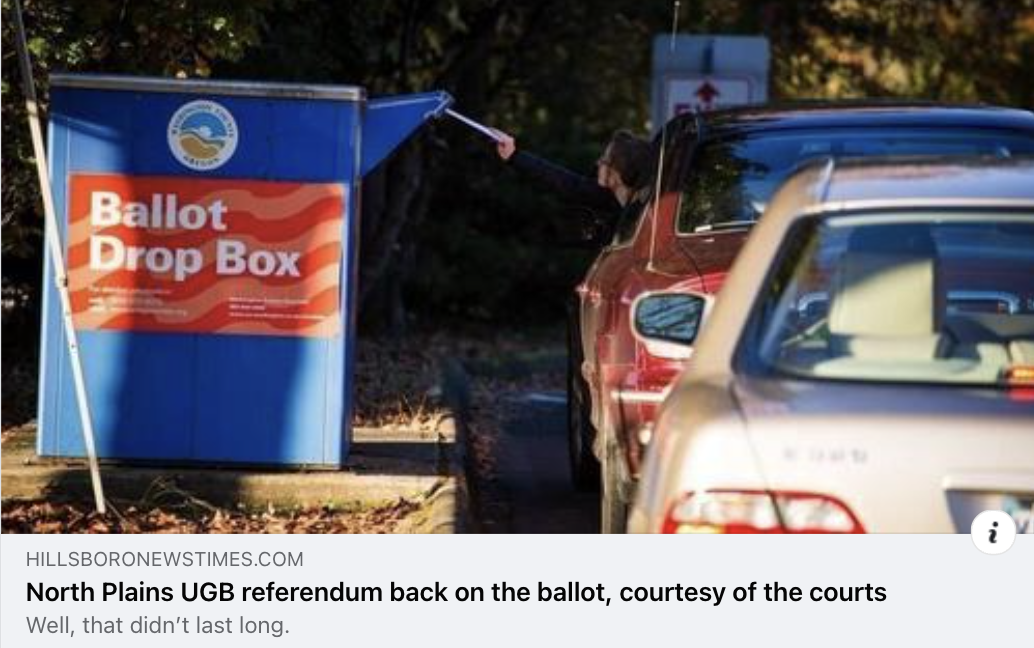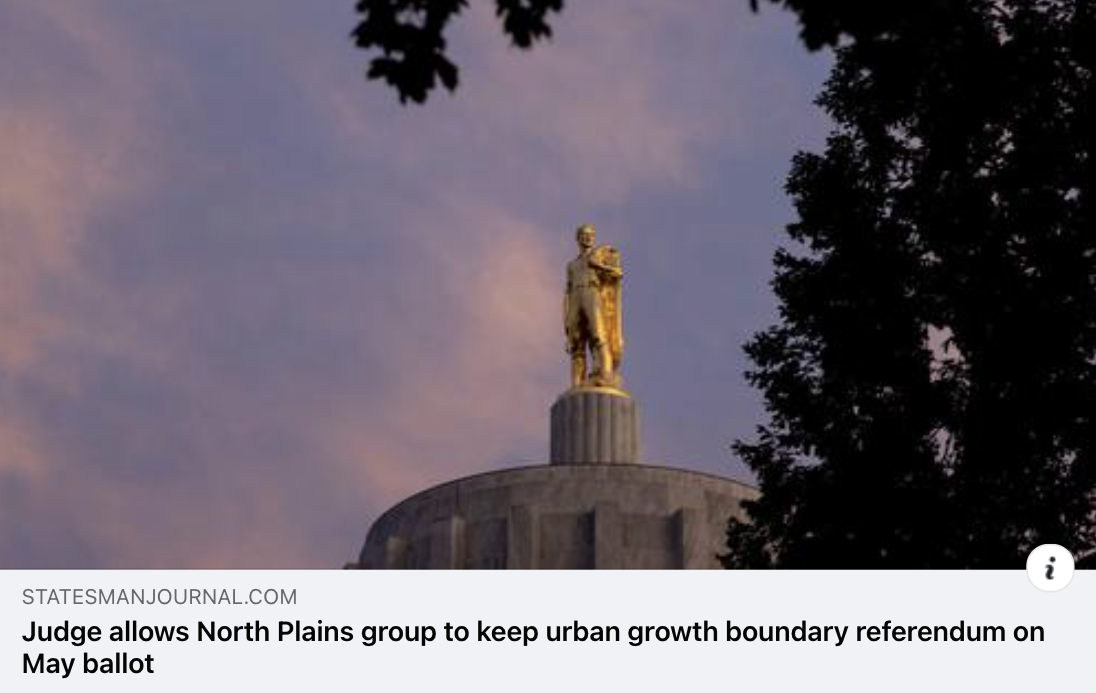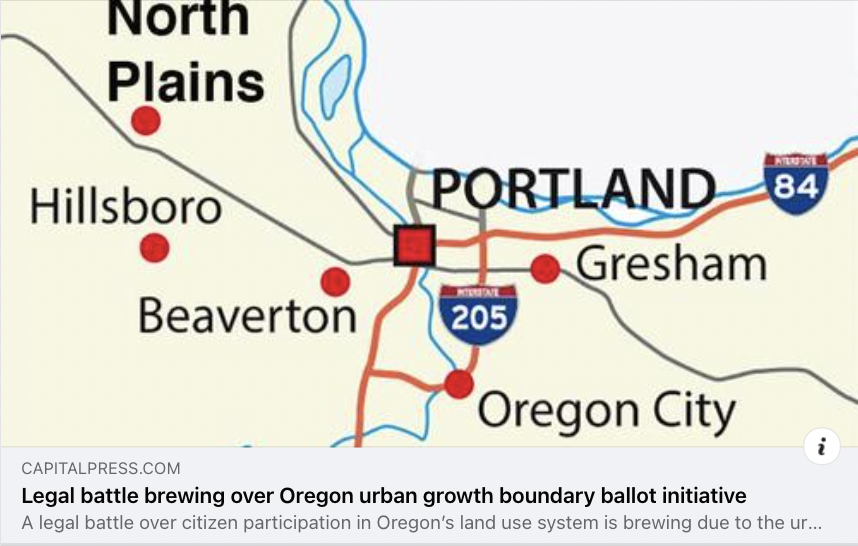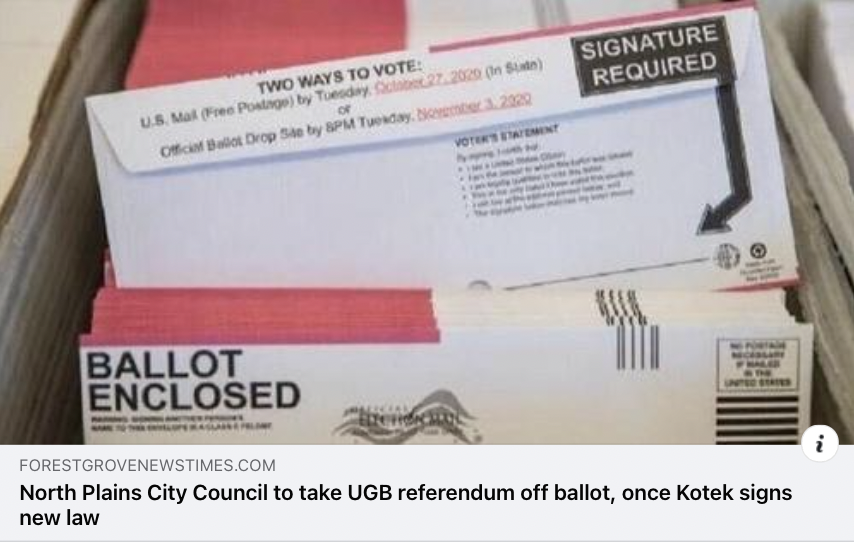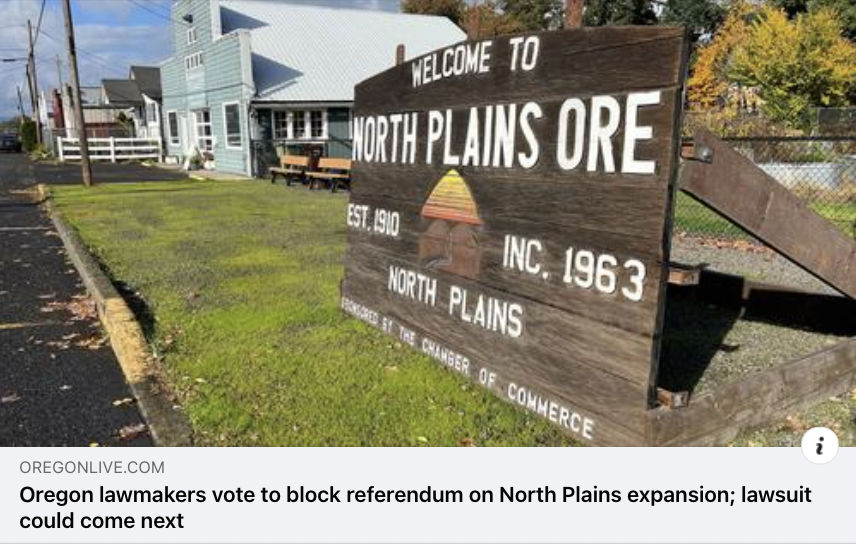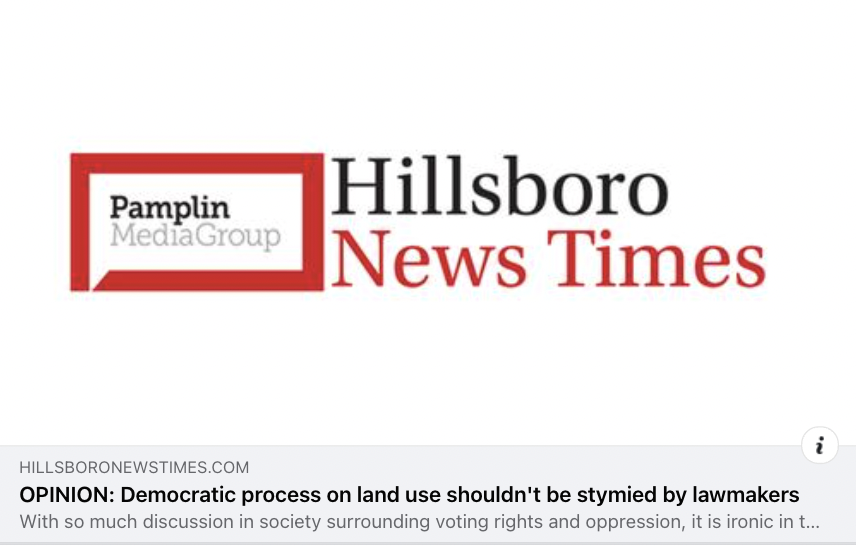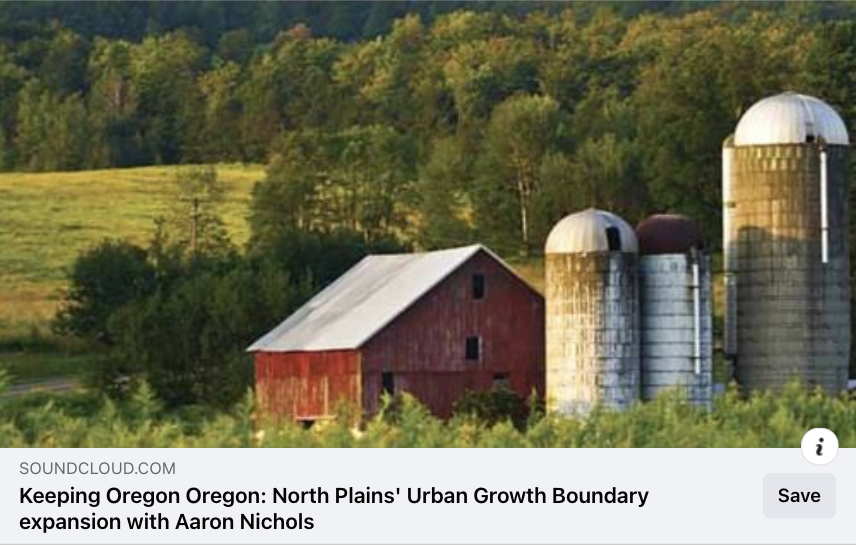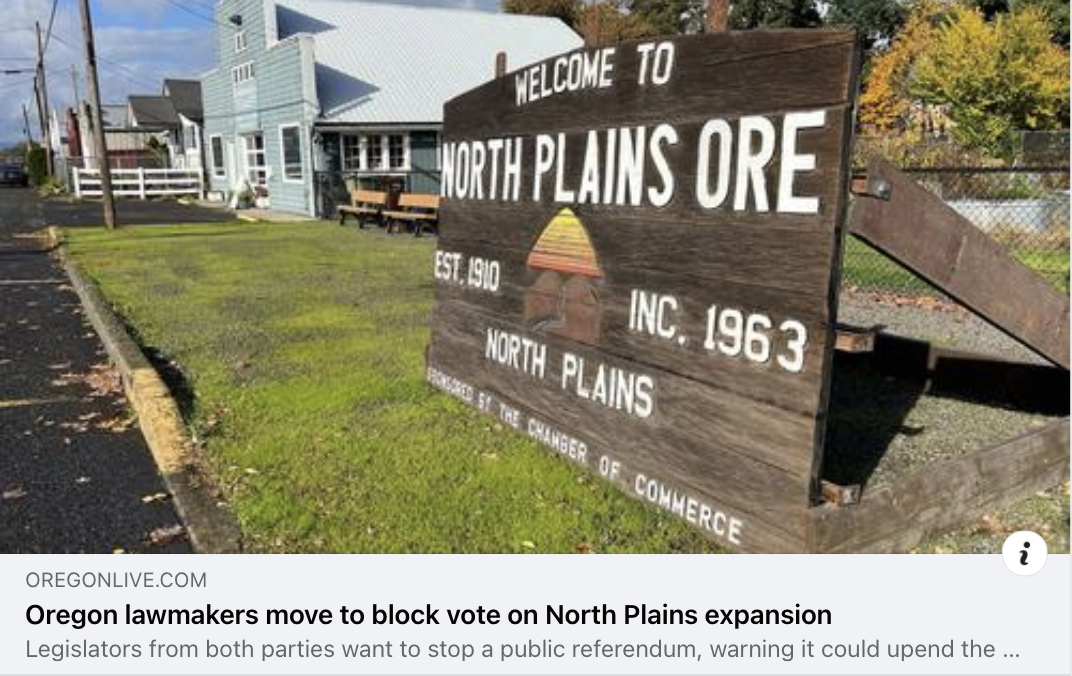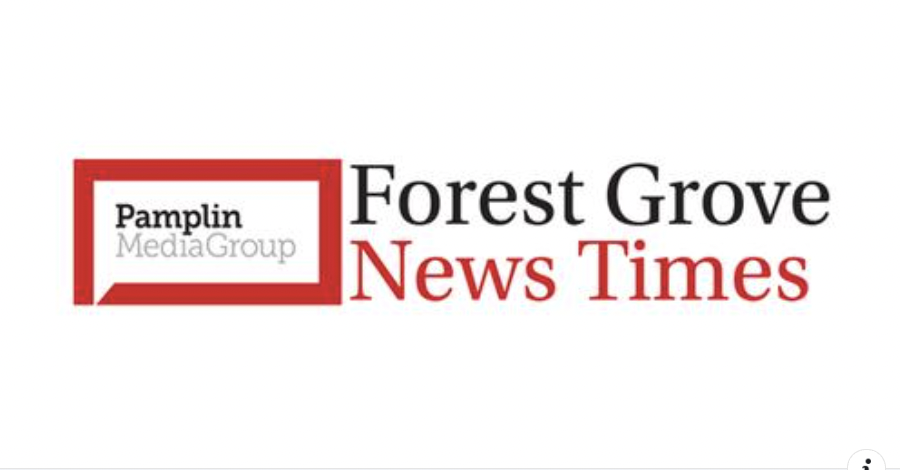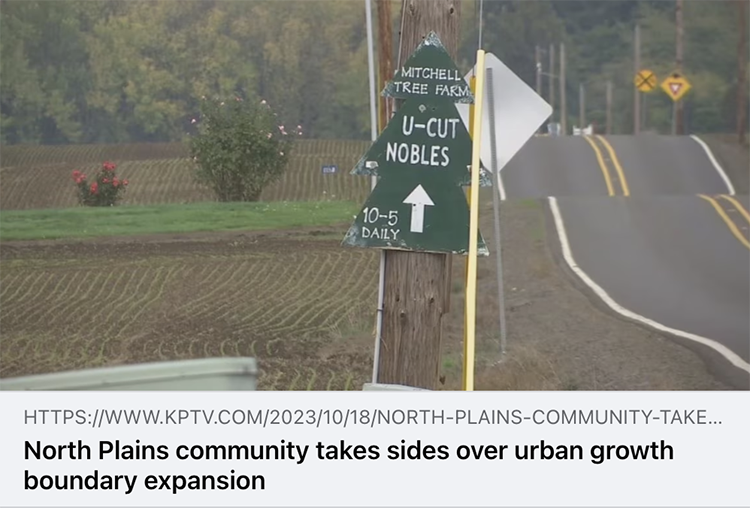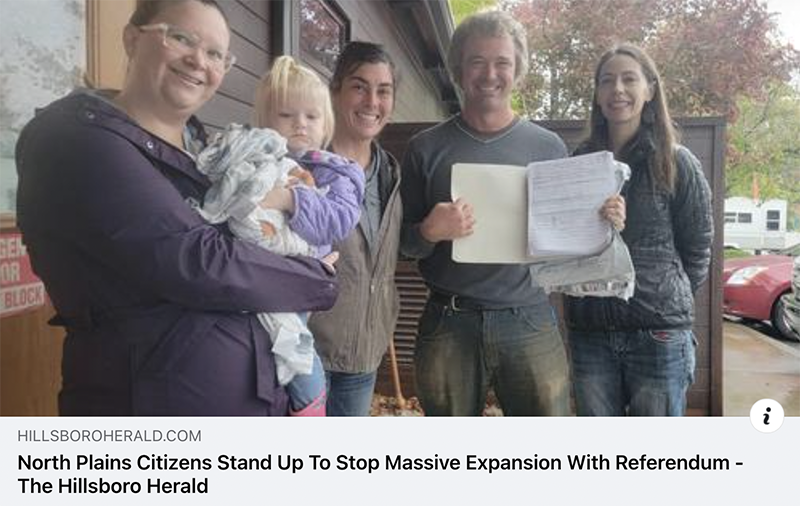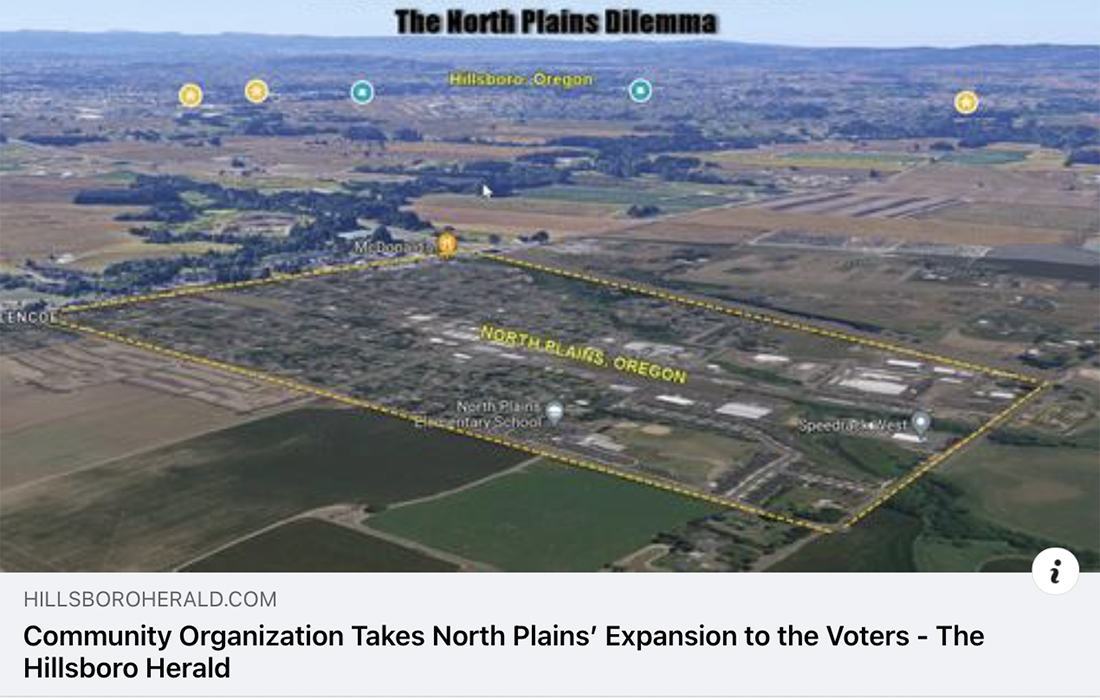KEEPING OREGON OREGON
Radio show on KMUZ interviewing Aaron Nichols on Measure 34-327. Hosted by Aileen Kaye.
MAY 1, 2024
HILLSBORO HERALD
North Plains urban growth forum draws over 100 participants
Local People Gather To Learn More About What Is At Stake As Measure 34-327
(Watch the YouTube video here)
APRIL 26, 2024 | by Dirk Knudsen
High turnout and lively discussion at Growth Referendum Forum
Over 100 people attended a Forum last Saturday at the Eagles Nest Reserve in Helvetia to hear about the future of North Plain’s growth. The small Oregon town faces the largest expansion of an Urban Growth Boundary (UGB), by percentage basis, in Oregon’s history. Several speakers were in attendance, and professional planner Ron Bunch presented a detailed report on the viability of the growth. Friends of North Plains Smart Growth rose up to oppose this level of growth and obtained hundreds of signatures to get a referendum on the ballot, now known as Measure 34-327. The City Of North Plains led an effort to force through a State of Oregon law that now limits any ability of local citizens to vote on matters of growth, a law under appeal in the Oregon Courts. On top of that, the City Council voted to compel the Washington County Elections Division to remove the Measure from the ballot, making it clear they do not want a vote on this matter. The Friends of North Plains filed a legal action in Washington County, and a judge ruled that the measure would be on the ballot. Will the votes be counted? Who knows.
The Growth Referendum Forum drew a crowd, and people with all forms of opinions were present. Many came to learn more about this now polarizing situation, created by North Plains Mayor Teri Lenahan and the City Council, who passed growth resolutions that allow the City to grow over 100% larger than its existing footprint. On top of the aggressive growth stance, the Mayor led a legal effort that passed a State law, House Bill 4026-A, which prevents any group of citizens in Oregon from voting on growth issues, something that will change the landscape of Oregon’s future forever.
North Plains, Oregon, proposed growth shows the current City and the expanded City with Industrial and residential zones designed by the City officials. This model was done by a member of the no-growth crowd, but it is accurate as to the growth areas and the potential uses. This brings it all home for people to see.
The atmosphere at the event was positive and inquisitive, with many participants expressing a desire for factual information. Unlike some forums, this one avoided political rhetoric. Friends of North Plains Smart Growth, SAVE Helvetia, and other groups were in attendance. The City of North Plains, the Mayor, and the YES On Growth campaign were noticeably absent, although a great effort to invite and gain their attendance at the Forum was made, according to organizers. Perhaps the Yes On Measure 34-327 was not prepared to defend their proposed expansion plan, which claims overwhelming public support (80% in favor) without evidence. Led by a Portland consulting firm SWIFT PUBLIC AFFAIRS that specializes in swaying public opinion, the YES crowd has pushed ahead. Their funding is led by the Portland Metropolitan Association Of Realtors (which is supported by home-builders and brokers), land owners who will benefit by tens of Millions once their lands are brought in, BTG, LLC, which is directed by legendary Commercial Broker Don Maltase, and others.
The audience’s questions highlighted the significant knowledge gap surrounding the issue. Many were unsure about the source of non-potable (NP) water, data center water consumption, and the infrastructure needs for such large-scale projects. Several attendees were curious about the City’s justification for expansion, which couldn’t be answered definitively without resorting to speculation. A recurring theme was the lack of voting rights for stakeholders directly impacted by the decision. The City’s reference document, the June 2023 Final Report, was the only answer offered to inquiries about the land acquisition rationale.
HILLSBORO HERALD
Battle For North Plains future to be debated at Saturday forum but city officials refuse to show
APRIL 19, 2024 | by Dirk Knudsen
Editors Note: The future of the City of North Plains is being debated across the State because the decisions to double the size of the town and place heavy industries adjacent to Schools and people is raising serious questions. On the one hand are local farmers and residents of North Plains who have lobbied for a decision to be made by a city-wide vote on growth. On the other is the City of North Plains Mayor, City Council, State Leaders like Senator Janeen Sollman, and Governor Kotek and her team, who seem to want to more than double the size of North Plains and silence the voters and citizens at all costs. This has been done by City and State laws that were hurried through in March to stop the vote and strip the locals of their choice. North Plains now finds itself as Ground Zero of the question- do local Oregon citizens have any choice in their futures, or is the State now controlling everything? What kind of world would that be? Certainly not one true to Oregon’s guiding principles.
North Plains, Oregon, proposed growth shows the current City and the expanded City with Industrial and residential zones designed by the City officials. This model was done by a member of the no-growth crowd, but it is accurate as to the growth areas and the potential uses. This brings it all home for people to see.
This Saturday, there is an old-school town hall-style event to debate the merits of both growth and no growth. All of the information is listed below. So far, City officials have rejected the invitation to attend, as have the Portland Metropolitan Association of Realtors and other supporters of the Yes on Growth side, which I find appalling and telling. They know this sort of forced growth is dangerous and not supported. Whatever they have going on, they should come and make their case. That is the Oregon way- not hiding in offices and hoping the Governor and Courts force the agenda through. Rumors are swirling that land deals have been made and that a big Industrial user is in the queue that may end up in North Plains and North Hillsboro – these forced decisions are needed to lay the groundwork for a fast-track approval. Time will tell, but that is not out of the realm of possibility and lines up with land options and other details we have. It may answer the question as to why these elected officials are putting themselves in this position of evil overlord and risking their positions. None of it makes sense otherwise. But who really knows/
Please attend – no matter what side you are on. Go to the Eagles Nest Reserve and listen, ask questions, and hear the various arguments. Listed below is the press release sent to the Herald and all the information you need to get involved and hear some great neutral panelists.
Release Date
Wednesday, April 17th, 2024
For immediate release
North Plains, OR. Friends of North Plains Smart Growth will be attending a neutral community forum to discuss and debate the coming Urban Growth Boundary Ballot measure in North Plains. This forum will include Aaron Nichols from FNPSG, Dean Moberg, an NRCS commissioner and the co-author of “The Soils of Western Oregon,” and Ron Bunch, the only city planner to date to do an order-of-magnitude analysis of the UGB expansion plan to give a rough idea of the costs and impacts of the expansion. The Yes campaign, the Mayor, and representatives of the city have all been invited, and a chair will be reserved for them, though, to date, none have agreed to participate. The panel will be moderated by long-time resident Linda Galas-Merton. Those in attendance will be welcome and encouraged to ask questions of the panel.
Background: In September, the North Plains City Council voted to expand their city by 855 acres – the largest Urban Growth Boundary (UGB) expansion by percentage basis ever in Oregon. Shortly after, Friends of North Plains Smart Growth collected signatures to have the city’s UGB expansion plan put to voters this May as measure 34-327. This was the first time in the 50-year history of Oregon’s land use program that a referendum was called on a UGB expansion decision.
The referendum was thrown into chaos when the State legislature, heavily lobbied by the city, passed a last minute bill to retroactively disallow all referendums on UGB issues – a law clearly targeting only the North Plains referendum. The governor signed the bill into law on Wednesday, March 20, giving the group mere hours to file a temporary restraining order to prevent the county from removing the referendum from the May ballot. The judge in the case, Judge Erwin, granted the restraining order on March 21st ensuring the referendum would stay on the ballot saying: “Elections laws should be liberally construed to the end that people should have the opportunity to express opinions concerning vital matters to their welfare. Expression, not suppression, tends toward good government. The great constitutional privilege of the citizen to exercise his sovereign right to vote should not be taken away by narrow construction.”
Since the 21st, both the No and Yes campaign have been canvassing the city arguing that a vote for their side will protect farmland, keep the small town feel of North Plains, and better serve the city long term. Aaron Nichols, an organizer from Friends of North Plains Smart Growth, states in an open letter to the Yes campaign, that while both sides express the same values, he is concerned how the Yes campaign is “going about making [their] arguments to the citizens. All the information for every argument in favor in the voter’s pamphlet is provided by one person – not a city councilor, not a resident – but Amy Ruiz, a paid public relations expert who lives in Portland. These arguments are primarily paid for and promoted by … the Portland Metro Association of Realtors who donated $10,000 to [the yes] campaign. It’s important not to let the money of well-heeled and narrow interests speak for us in this campaign. It is important to talk about the facts, not poll tested talking points.” He went on to challenge the Yes campaign to a debate either at this forum or a forum of their choosing – as of this press release, neither the yes campaign nor any city councilors have replied.
Community Forum: This Saturday from 3-5 PM at Eagles Nest Reserve Winery the public will be able to not only hear from experts on the history of this one-of-a-kind referendum, from a retired city planner with deep knowledge of Oregon small towns and this issue in particular, a local farmer-advocate concerned about farmland and communities, and a soil scientist with a lifetime of experience in soils in the area. In the years that the city has been working on its UGB expansion plan, this is the first widely and proactively noticed meeting where people will have a chance to ask questions of experts and, should the Yes campaign show up, hear multiple sides of the issue.
Press and the public are invited to the event (3-5 PM) and the subsequent Happy Hour (5-6PM) at the winery. Eagle’s Nest Reserve is in Helvetia: 12995 NW Bishop Rd, Hillsboro, OR, 97124. Previous events of a similar nature brought over 100 people from North Plains and the surrounding area and a large attendance is expected for this event. For further information, please reach out to Aaron Nichols at friendsnorthplainssmartgrowth@gmail.com.
HILLSBORO HERALD
County judge slaps down North Plains leaders and allows vote on growth
Restraining Order Granted To North Plains Citizens To Put Vote On Ballot
MARCH 24, 2024 | by Dirk Knudsen
Outraged citizens win temporary victory against City Council’s attempt to silence the people.
On March 14th, 2024, in an emergency session of the North Plains City Council, Mayor Teri Lenahan and the City Council, led by legal opinions of City attorney Christopher Crean, frantically pushed through an Ordinance in a special session to make sure that the Referendum on North Plains Growth was removed from the Washington County ballot. Anyone in the meeting witnessed this group of leaders offer little debate and forcefully drive through the Ordinance. Why? Clearly, they did not want to allow the vote nor have the general public see the outcome, which would, by all odds makers, prove beyond the shadow of a doubt that the residents of North Plains do not support the decisions of the Council.
North Plains Growth vote stopped by North Plains City Council
Following that vote and just hours after Governor Kotek signed a State bill aimed at stripping North Plains voters of their right to decide on urban expansion, a coalition of concerned residents, including Friends of North Plains Smart Growth and Save Helvetia, scored a decisive legal victory.
In a last-minute reprieve, a Washington County judge indicated his intention to issue a temporary restraining order on Thursday. This order would compel election officials to include the North Plains UGB expansion referendum on the May 21st ballot. Judge Andrew Erwin’s decision hinged on the argument presented in a lawsuit filed earlier that week by Friends Of North Plains Smart Growth, which asserted the voters’ right to participate in the decision-making process.
This ruling places significant time pressure on Washington County, which aims to finalize ballots this week. With the limited window for appeal, North Plains residents appear likely to cast their votes on whether the community should double in size by incorporating an additional 855 acres.
However, a cloud of uncertainty hangs over the potential outcome. In a move raising concerns about legislative overreach, the Oregon Legislature, led by Senator Janeen Sollman and others, recently passed House Bill 4026. This bill effectively thwarts public referendums on urban growth boundary (UGB) expansions for cities.
Notably, the legislation was applied retroactively, specifically targeting a referendum in North Plains already slated for the May 21st ballot. Governor Tina Kotek signed the bill into law on Wednesday. The state’s legal representatives contend that city expansions are exempt from referendums, and there is no precedent for Oregon courts addressing this specific issue.
The City Council’s maneuvering—approving an ordinance to remove the voter referendum from the ballot the moment a seemingly convenient state law passed—has been halted by a temporary restraining order. This blatant attempt to subvert democracy was exposed, and for now, the referendum will appear on the May ballot as planned. It is unclear whether the outcome will ever be known or become law due to the State ordinance which itself is headed to court.
This land use story is one example of how local control, citizen voices, and votes are suppressed by the overarching power of the State and special interests who seem to care very little for the wishes of local people. In so many ways, this case will be a landmark one.
THE OREGONIAN
Judge orders North Plains expansion vote to proceed despite new law that tried to stop it
MARCH 23, 2024 | by Mike Rogoway
Residents of North Plains will apparently get to vote on the city’s contentious expansion plans after all.
The Oregon Legislature passed a bill this month blocking public referendums on whether cities can expand their urban growth boundaries. Lawmakers made House Bill 4026 retroactive, hoping to stop a referendum in North Plains already scheduled for May 21. Gov. Tina Kotek signed the bill Wednesday.
Late Thursday, though, a Washington County judge said he will sign a temporary restraining order directing election officials to keep the referendum on the city’s May 21 ballot. Judge Andrew Erwin ruled that expansion opponents have a good chance of prevailing in a lawsuit filed this week that argues voters have the right to be heard.
Washington County wants to finalize its ballots this week, giving North Plains little or no time to appeal the restraining order. So residents likely will get to weigh in on whether the small bedroom community west of Portland should add 855 acres, more than doubling in size.
It’s not clear, though, whether the vote will ultimately have any legal weight. State attorneys say cities’ expansions aren’t subject to referendums, and Oregon courts don’t appear to have ever taken up the issue.
That’s because, before now, it doesn’t appear anyone has ever sought to force an urban growth boundary onto the ballot.
North Plains officials spent years planning the city’s expansion. The affluent suburb of 3,400 residents has a much lower property tax rate than neighboring communities, and its elected officials want to add commercial and industrial activity so taxes generated by their operations can fund more city services.
Opponents say the proposed expansion is too large and would replace farmland with data centers and warehouses.
The issue has stirred passions among North Plains’ 3,400 residents and those living in the small agricultural communities around the city. It has major implications for the rest of the state, too.
HB 4026 passed the Legislature with broad, bipartisan support. Lawmakers said that allowing a public vote at the end of several years of careful planning for cities’ urban growth boundary expansions could upend the process, and perhaps discourage cities from even attempting to expand.
They warned locking in present-day boundaries could impede economic growth and imperil the state’s plan to address Oregon’s housing shortage by adding urban land.
The bill’s opponents contend that the North Plains referendum is unusual simply because it’s an unusual case. They maintain the city’s expansion plans are too large and weren’t properly vetted with North Plains residents and nearby farmers. Future referendums are likely to be rare, opponents say.
Ultimately, it’s a constitutional question: Is a city’s expansion of an urban growth boundary a legislative decision, or is it an administrative action undertaken to comply with Oregon land-use law?
The Oregon Constitution mandates that voters be allowed to refer legislative decisions to the ballot. It prohibits referendums on administrative actions.
State courts may have the final say on the issue, which means the May referendum in North Plains might end up being merely advisory.
Regardless, supporters and opponents of North Plains’ expansion are beginning to gear up for the election.
“Expect to see a lot of signs around town, bumper stickers, and hear the talk in town,” said Aaron Nichols, a farmer living near North Plains who opposes the expansion.
North Plains City Manager Andy Varner said the city is still determining its next steps but indicated that officials there believe they made a strong case for expansion during years of planning.
“I know there are plenty of (North Plains) residents that are going to defend the city’s work and do the voter education necessary,” Varner wrote in an email Thursday night.
-- Mike Rogoway covers Oregon technology and the state economy. Reach him at mrogoway@oregonian.com
HILLSBORO NEWS TIMES
North Plains UGB referendum back on the ballot, courtesy of the courts
MARCH 21, 2024 | by Lauren Bishop
Well, that didn’t last long.
The day Gov. Tina Kotek signed a bill that effectively ended the pursuit of a voter referendum on North Plains’ urban growth boundary expansion, opponents pushed back in court — and, at least temporarily, won.
Within a matter of hours on March 20, Friends of North Plains Smart Growth announced that they and other plaintiffs had filed for a temporary restraining order to keep the voter-initiated referendum on the ballot in May. The opponents of the UGB expansion argued that the city overstepped in trying to take the referendum off the ballot and that the new state law that seemed to allow the alleged overreach was unconstitutional.
By the next day — and with hours to spare — Washington County Circuit Court Judge Andrew Erwin granted the temporary restraining order, which will allow the ballot measure to go to voters in May.
How we got here
This land use battle has been waging for six months, after the North Plains City Council approved a UGB expansion that would bring 855 acres into the city limits in September. Neighbors pushed back with concerns about the loss of agricultural land and North Plains’ small-town charm, going as far as collecting enough signatures to put a referendum on the ballot.
The lawsuit was filed March 18 against City Elections Officer Lori Lesmeister, the North Plains City Council and Daniel Forester, elections manager for Washington County. Four days prior, the North Plains City Council approved an ordinance that states if Gov. Tina Kotek signed House Bill 4026 into law, the city recorder would ask the Washington County Elections Division to take the voter-initiated referendum off the ballot.
After Kotek signed the bill March 20, the plaintiffs — including Friends of North Plains Smart Growth and Save Helvetia — filed for a temporary restraining order that would keep the initiative on the ballot. But with ballots set to be printed March 21, the parties and the court were cutting it close.
Hours before quitting time March 21, Edwin granted the temporary restraining order, thus keeping the referendum on the ballot.
But this legal win for the opponents of the city’s expansion is not the end of the road.
“We fully expect the city to continue to fight this in court,” said Aaron Nichols, organizer of Friends of North Plains Smart Growth, in a release. “They haven’t accepted that direct democracy puts the final decision in the hands of voters yet and I am sure they will challenge this law for as long as they can. And I am sure they will continue to lose in court.”
The temporary restraining order is just one portion of the larger lawsuit, which asks the court to deem the new legislation illegal.
Plaintiffs claim the city council and city staff acted beyond their authority to approve removing the measure from the ballot, and that the new law violates the Oregon Constitution.
The lawsuit goes on to say that any challenges to the referendum should not take place until after the results of the election have been certified in June.
The timeline for the Washington County Circuit Court to rule on the constitutionality of the legislation is unclear, especially when more legal action relating to the referendum could be filed after the election is certified in about three months.
And what happens next, as far as the city is concerned, is still up in the air.
“The city is still determining next steps,” Mayor Teri Lenahan said Friday, March 22. “For now, however, I know there are plenty of North Plains residents that are going to defend the City’s work and do the voter education necessary.”
STATESMAN JOURNAL
Judge allows North Plains group to keep urban growth boundary referendum on May ballot
MARCH 21, 2024 | by Dianne Lugo
Washington County Circuit Court judge Andrew Erwin granted a temporary restraining order Thursday that allows a North Plains referendum to remain on the ballot this May, in what appears to be the first legal challenge of a law Gov. Tina Kotek signed that would have retroactively banned referendums on Urban Growth Boundary issues.
"We fully expect the city to continue to fight this in court,” Aaron Nichols with Friends of North Plains said in a press release. “They haven’t accepted that direct democracy puts the final decision in the hands of voters yet and I am sure they will challenge this law for as long as they can. And I am sure they will continue to lose in court.”
Last September, the city council of North Plains proposed doubling the city's size by adding 855 acres to its Urban Growth Boundary. Friends of North Plains petitioned to send the proposal to voters through a referendum in May.
But lawmakers essentially killed the proposed measure during the short session when they approved House Bill 4026. The bill limits what can be sent to a referendum vote, banning land-use decisions from being subject to referendums. It retroactively applied to the North Plains proposal.
During the short legislative session that ended early this month, legislative attorneys said the bill was “redundant,” but necessary, to clarify that land use questions are administrative and not legislative so they are outside the scope of referendum powers of local voters.
“Although the referendum right is constitutional, it is not unlimited,” Catherine M Tosswill, special counsel with the legislative counsel committee, wrote Feb. 20 in a letter to Rep. Mark Gamba, D-Milwaukie, who had asked whether the bill was constitutional.
Supporters of the bill said the process to expand a city’s Urban Growth Boundary already requires a lengthy approval process. HB 4026 received bipartisan support in both chambers passing 45-9 in the House and 25-3 in the Senate.
URBAN GROWTH BOUNDARY PROCESS SHOULD BE EXEMPT FROM REFERENDUM, SUPPORTERS ARGUE
The League of Oregon Cities specifically addressed the North Plains situation in testimony during the Legislature.
Expanding the Urban Growth Boundary requires a process established in 1973 by a law that provides “ample opportunity” for stakeholders to make their voice heard, said Ariel Nelson with the League of Oregon Cities.
Cities that don’t comply with the requirements of the Land Use Board or Land Conservation and Development Commission send proposals back to the city.
“Cities need to rely on a predictable land use system to do their part in addressing Oregon’s housing crisis," Nelson said. "The existing UGB expansion process is long, expensive, and litigious. Cities cannot afford to litigate referrals.”
Referendum referrals could be weaponized to prevent UGB expansion decisions and other decisions that will come as cities try to meet new production goals, she added.
Nelson's comments were echoed by the Association of Oregon Counties which said the bill would help cities continue partnerships with the state on the current housing crisis.
In a vote explanation, Sen. Janeen Sollman, D-Hillsboro, said a referendum petition coming at the end of a long year’s process “undermines the land use system we have built over the years.”
FRIENDS OF NORTH PLAINS SMART GROWTH CONDEMNS GOVERNOR SIGNING BILL
Friends of North Plains called the legislation an attempt from developers, the city council, and state lawmakers to cancel an election “they don’t want to happen" in a statement released Wednesday announcing they had filed for a temporary restraining order to keep the referendum on the ballot this May.
The group's lawsuit seeking a temporary restraining order to keep the referendum on the ballot was filed against Lori Lesmeister, city elections officer for the City of North Plains, the North Plains City Council, and Daniel Forester, the elections manager for Washington County.
The petition asked the Washington County Circuit Court to grant emergency relief and keep the referendum on the May ballot. The deadline to withdraw or remove referendums from ballots was Thursday afternoon.
“It's concerning that the Governor signed the bill into law only late in the afternoon the day before the election filing deadline," Jesse Buss, the attorney representing the group, said in a prepared statement. "That delay created, intentionally or not, a highly constrained timing situation, giving the voters of North Plains very limited time —measured in hours, not days or weeks — to go to court.”
They asked the court to order the referendum to be submitted to North Plains voters, to prohibit the removal of any attempt to remove the referendum from the ballot, and any other temporary relief the Court deems necessary.
"The Oregon Legislature has no authority to declare what is, and what isn’t, subject to the constitutional right of referendum. It is that simple," the complaint reads.
LARS LARSON RADIO SHOW
North Plains, OR citizens denied the right to vote on urban growth boundary referendum
Lars Larson on the legal battle over citizen participation over the urban growth boundary expansion of the City of North Plains.
This aired hours before Friends of North Plains Smart Growth was granted a restraining order to keep the referendum on the May ballot (votes as of right now will not count, but we are going to court in hopes of changing that).
CAPITAL PRESS
Legal battle brewing over Oregon urban growth boundary ballot initiative
MARCH 18, 2024 by Mateusz Perkowski
A legal battle over citizen participation in Oregon’s land use system is brewing due to the urban growth boundary expansion of the City of North Plains.
Last year, city officials voted to double the town’s size by adding 855 acres of developable land to the boundary, spurring opponents to collect enough signatures for a ballot initiative to overturn that decision.
However, lawmakers have since passed a bill prohibiting UGB expansions from being referred to voters, not only in North Plains but across the state.
Supporters of House Bill 4026, which passed the House and Senate with broad bipartisan majorities, claim such referenda would amount to “ballot box planning” that throws the state’s land use system into disarray.
“Our land use process must be predictable. It’s based on predictability, and without it, cities really can’t plan,” testified Dave Hunnicutt, president of the Oregon Property Owners Association.
Critics of HB 4026 argue the expansion in North Plains warrants a ballot initiative because it’s an extreme case, with city officials ignoring public input against industrialization and farmland loss.
It’s unlikely other UGB expansions would give rise to enough opposition to get a referendum on the ballot, as evidenced by the lack of such initiatives in the past, according to critics.
“Bringing a referendum to voters is a very difficult process — not one that’s likely to be used in lesser cases,” said Aaron Nichols, who grows vegetables near North Plains, during a legislative hearing.
“We chose a referendum as a last resort and found the process intentionally difficult and time-consuming,” he said. “It’s not an option we’d recommend to other groups and definitely not one we’d used again unless under dire circumstances.”
With HB 4026’s passage, city officials in North Plains recently voted to withdraw the ballot initiative, which was scheduled to be decided during the May 21 election.
City officials unanimously approved scrapping the referendum even though they did not believe it would have legal force, saying the election could lead to confusion among voters.
However, that decision is unlikely to end the controversy, as Friends of North Plains Smart Growth — a group that opposes the UGB expansion — is planning a lawsuit challenging the legality of HB 4026.
The organization plans to argue such ballot initiatives are a constitutional right that lawmakers cannot prohibit without amending the state constitution itself.
It also claims lawmakers violated the constitutional separation of powers between the branches of state government by usurping the role of courts in determining whether a matter can be decided by referendum.
Opponents of the North Plains expansion and HB 4026 claim the alleged hazards of such referenda have been greatly overstated, as they can’t be used to micromanage zoning or other administrative matters.
“A referendum simply invalidates the current plan and invites the city to work with community members to create a new one,” said Nellie McAdams, board president of the 1,000 Friends of Oregon farmland preservation nonprofit.
Few UGB expansions would be egregious enough to provoke ballot initiatives, McAdams said.
Sometimes, though, local governments refuse to listen to the public when making land use decisions, which is why such referenda should be allowed, said Peter Kenagy, who farms in Benton County.
“In those cases, it’s imperative that citizens have a fallback option,” Kenagy said.
However, supporters of HB 4026 say the bill doesn’t silence anyone.
Objections to UGB expansions can already be heard through other legal processes, such as the state’s Land Use Board of Appeals and Court of Appeals, according to bill supporters.
“This bill does not shortchange people’s ability to say what they want,” said Hunnicutt of OPOA. “They just need to say that through the traditional process for UGB amendments.”
FOREST GROVE NEWS TIMES
North Plains City Council to take UGB referendum off ballot, once Kotek signs new law
MARCH 15, 2024 | by Lauren Bishop
It’s official: The North Plains urban growth boundary expansion will stand, at least as far as the city is concerned.
The city council met in a special session Thursday, March 14, to adopt an ordinance that states if Gov. Tina Kotek signs House Bill 4026 into law, the city recorder will ask the Washington County Elections Division to take the voter-initiated referendum off the ballot.
The land use battle has been waging for six months, after the North Plains City Council approved a UGB expansion that would bring 855 acres into the city limits in September. Neighbors pushed back with concerns of the loss of agricultural land and North Plains’ small-town charm, going as far as collecting enough signatures to put a referendum on the ballot.
‘There’s no reason to wait’
North Plains’ attorney Chris Crean said Thursday that the special meeting was necessary because the county elections division said it would not remove a measure from the ballot without prompting from the city recorder, even if the election question at hand has now been deemed illegal.
Kotek has 30 days to consider the bill once it hits her desk, but Crean said he is expecting Kotek will sign it into law early this week, just in time for the referendum to be taken off the North Plains ballot. Kotek had not signed the bill as of press time Monday afternoon, March 18.
With the March 21 deadline for municipalities and districts to add or remove measures from the ballot, Crean said North Plains was running out of time.
“There’s no reason to wait. If she doesn’t sign it, it won’t be withdrawn,” Crean said. “There’s no reason not to be prepared if the governor does sign it.”
In a unanimous decision Thursday, the council agreed to direct Washington County to take the measure off the ballot, should Kotek sign the bill before the March 21 ballot deadline. As of Friday afternoon, March 15, the bill still sits on the Senate President’s desk, awaiting signature. From there it would head to Kotek’s office.
Before the vote, Council President Russ Sheldon said he felt the UGB expansion was not something that could be referred to the voters from the beginning and was happy to go about undoing the ballot measure “in the right way.”
“Despite some calls for constitutionality of the voice of the people, I’m just not sure that applies to this case,” he said. “I know people do want to voice their concerns, but I think we’re past that point.”
The state does not require cities to allow public testimony before the council votes on resolutions. About 50 people outside city councilors and staff listened in to the meeting, with two attempting to make their voices heard without speaking.
One woman changed her Zoom background to “THIS IS WRONG. The Public (deserves) to speak.” Another held up a note card to the camera with “NO Voter suppression” written on it.
But still a waiting game
Washington County commissioners — who must greenlight the UGB expansion before it goes to the Oregon Department of Land Conservation and Development for final approval — decided late last year to wait until after the May election referendum results are certified to add North Plains’ UGB expansion to their agenda.
But with the May election now off the ballot, as far as the city is concerned, it’s unclear when the commissioners will revisit North Plains’ UGB plan.
It’s also unclear what happens if Kotek does not sign the bill before ballots are printed March 21. Similar to when a candidate pulls out of a race after the window to withdraw passes, it is likely that the ballot would be sent out with the UGB referendum still in place on North Plains ballots.
But that, too, could spell trouble for the city and the county as it goes to certify the election in June.
Crean predicted that if the ballot was printed with the referendum on it, litigation would be filed to prohibit the certification of the vote, “on the theory that the election itself was unlawful.”
“If this ends up on the ballot because the governor waits too long to sign the bill or some other reason and then the bill becomes law, who knows what’s going to happen,” Crean said. “I think the greatest likelihood is that there would be a lawsuit challenging the county’s ability to certify the result of the election.
“The votes would be cast but wouldn’t be counted, and it would never be certified. You can imagine how happy that’s going to make people.”
BNN BREAKING
Oregon legislature blocks North Plains urban expansion referendum, potential lawsuit looms
MARCH 7, 2024
In a decisive move, the Oregon Legislature has voted to prevent North Plains residents from challenging the city's urban growth boundary expansion via a referendum, a decision that is stirring controversy and setting the stage for a potential legal battle. The city of North Plains, with a population of around 3,400, has been aiming to more than double its size, a plan that has faced opposition from local residents and conservationists concerned about the loss of farmland and the increase of industrial development. If Governor Tina Kotek signs the bill, opponents have vowed to sue, marking a significant moment in Oregon's land-use debate.
Background of the Controversy
North Plains' expansion plan has been in the works for years, with the aim of transforming the city from a bedroom community to a more industrialized area, thereby broadening its tax base. Last year, the plan to add 855 acres to the city was finalized, sparking opposition from residents and nearby farmers who fear the replacement of valuable farmland with data centers and warehouses. In response, opponents initiated a referendum, a move unprecedented in the history of Oregon's land-use system. However, public officials argue that urban expansions are administrative actions, not legislative, and thus not eligible for voter referendums under the state Constitution.
Legislative Response and Public Reaction
The Oregon Legislature's response, through House Bill 4026, aims to clarify that such expansions cannot be challenged by referendum, applying retroactively to the North Plains situation. This legislative move has drawn criticism from land conservationists and voting rights activists, who argue it violates the Oregon Constitution by undermining the referendum process. Despite the controversy, HB 4026 passed with bipartisan support, indicating broad legislative agreement on the need for a predictable land-use process to address the state's housing crisis.
Implications and Next Steps
The passage of HB 4026 could have far-reaching implications for Oregon's urban planning and land-use policies, potentially limiting the public's ability to contest city expansion plans. If Governor Kotek signs the bill into law, the Friends of North Plains Smart Growth group has promised to sue, which could result in a legal interpretation of the state's constitutional provisions regarding referendums. This situation underscores the tension between accommodating growth and preserving community input in planning processes, a debate that is likely to continue in Oregon and beyond.
As this issue unfolds, the future of North Plains' expansion and Oregon's urban planning landscape hangs in the balance. The controversy highlights the complexities of balancing growth with conservation and public involvement, a challenge that cities across Oregon will continue to face as they seek to expand and develop.
FOREST GROVE NEWS TIMES
Lawmakers pass bill to take North Plains’ UGB referendum off the ballot
MARCH 8, 2024 | by Lauren Bishop
In what began as a benign bill requiring the Secretary of State to study improving voter access, an approved amendment now has implications for the land battle waging in North Plains.
House Bill 4026 was updated to limit the review — namely voter-initiated referendums — of urban growth boundary expansions, retroactive to 2023. The only referendum of the sort initiated last year, or perhaps ever in the state of Oregon? North Plains.
After the North Plains City Council approved an urban growth boundary expansion last year that would bring 855 acres into the city, neighbors pushed back with concerns of the loss of agricultural land and North Plains’ small-town charm.
Community organizers collected enough signatures to put the referendum of the ballot, but the legality of the May vote may be impeded because of the new legislation headed to Gov. Tina Kotek’s desk.
In the House, the bill was approved, with Reps. Farrah Chaichi (D-Beaverton), Dacia Grayber (D-Southwest Portland and Beaverton), Susan McLain (D-West Hillsboro, Cornelius and Forest Grove), Nathan Sosa (D-Hillsboro) and Brian Stout (R-Columbia County) in opposition.
On the last day of session Thursday, March 7, Senators passed the bill, with Sens. Daniel Bonham (R-The Dalles), Brian Boquist (R-Polk and Yamhill counties) and Art Robinson (R-Cave Junction) opposed.
What’s at stake
Critics who started the campaign to reverse the North Plains City Council’s decision to expand the city’s urban growth area have cited a lack of public involvement and concern for the loss of farmland as reason to pursue the referendum.
Meanwhile, City Manager Andy Varner has said with the city needing to plan for growth and development over the next 20 years, the urban growth boundary expansion puts the city on the right track for sustainable growth that could bring in more amenities to the area.
According to an analysis conducted on behalf of the city government in 2022, North Plains needs 655 acres of new employment land — mostly industrial — and another 150 acres for new housing over the next 20 years to account for population growth and new business opportunities.
Washington County commissioners — who must greenlight the UGB expansion before it goes to the Oregon Department of Land Conservation and Development for final approval — decided late last year to wait until after the May election referendum results are certified to take up the topic again.
But what exactly happens next is unclear — The bill, as amended, retroactively removes the right to place a referendum on the ballot relating to urban growth boundary expansions back to Jan. 1, 2023.
Lobbying efforts
Nearly two months from the vote, representatives of the city of North Plains argued in front the Senate Committee on Rules that state law already disallows UGB issues to be taken up on the ballot because there is other recourse on expansion proposals — namely the county and the state DLCD.
The testimony evolved into one about whether the amendment is a housing production issue (with proponents saying that referring UGB decisions and others they state are administrative decisions would grind housing projects to a halt) versus a constitutional rights issue (that the amendment would infringe on the rights upheld by the state Constitution).
“There is nothing remotely about this bill that infringes on anyone’s rights under the Constitution,” Chris Crean, attorney for North Plains, said. “There are already a number of statutes that clarify when a local decision can and cannot be referred to the people.”
Tim Holt, on behalf of North Plains Mayor Teri Lenahan and numerous other mayors, laid out that the city has been exploring UGB expansions in earnest since 2018, with more conversations predating the formal expansion process.
“However, other cities such as North Plains, Sisters, and King City face challenges as external groups influence local decisions through referendums and recalls, jeopardizing planned growth for their cities and for the State of Oregon, while upsetting the land-use processes along the way,” the letter reads in part.
(The King City recall, which officially removed four of seven councilors from office on March 6, is related to master planning and road extension proposals from the city.)
“The ambiguity surrounding UGB applications subject to referendums leaves many cities vulnerable to external influences. We urge you to advocate for codifying that the state-required UGB application procedures are not subject to being referred to voters by referendum petition, which would provide clarity and fairness in the urban planning process statewide,” the letter continues.
Meanwhile, leaders of the Friends of North Plains Smart Growth, which got the UGB referendum on the ballot in May, testified that the bill’s amendments may be unconstitutional.
Aaron Nichols, owner of Stoneboat Farms and one of the organizers of the referendum, argued that the bill is about local control and voters’ rights, not a simply clarification on existing law.
“This bill is about trying to take that voice away, trying to abridge a constitutional right, in the hope that the citizens who want this referendum will be unable to afford access to the court and lose by default,” Nichols said. “That’s neither a constitutional norm nor morally justified use of the state legislature’s power.”
Nichols added that if the bill passed as amended, his group would likely sue to challenge its constitutionality.
Nellie McAdams of Friends of North Plains Smart Growth and president of 1000 Friends of Oregon, said that the bill is not about land use and stymying housing production, but a move against voters.
“The fact that this bill was brought in a gut-and-stuff in a short session and would retroactively block the only known referendum on such a decision highlights the undemocratic process underlying its purpose,” McAdams testified.
THE OREGONIAN
Oregon lawmakers vote to block referendum on North Plains expansion; lawsuit could come next
MARCH 7, 2024 | by Mike Rogoway
The Oregon Legislature voted overwhelmingly to stop residents of North Plains from contesting the city’s plan to expand its urban growth boundary at the ballot box. Opponents of the expansion say that if Gov. Tina Kotek signs the bill, they will sue to stop it from taking effect.
North Plains has just about 3,400 residents, but the heated fight over its growth plans could have broad implications for farmers, forests and Oregon’s tech industry. And House Bill 4026 could answer a novel constitutional question about what issues are subject to voter referendums.
The city has been working on expansion for several years, aiming to bring in industry to expand its property tax base and grow into being more than a bedroom community. Plans finalized last year call for North Plains to more than double in size, adding 855 acres.
Some residents and others living nearby complained the city’s plan was too ambitious, though, and would replace farmland with data centers and e-commerce warehouses of the kind that has proliferated next door, in Hillsboro.
So opponents collected signatures to put the issue onto the ballot of North Plains voters in May. It appears to be the first time in the history of Oregon’s land-use system that anyone had sought to hold a referendum on a city’s plan to expand its urban growth boundary.
Public officials from around Oregon said there’s a reason no one had tried before: They say urban expansions are administrative actions, not legislative, and are therefore not subject to a voter referendum under the state Constitution.
Allowing voters to weigh in at the end of a process that can take a decade could render Oregon’ s urban planning unworkable, they said. And that could imperil the state’s goal to address its housing crisis by expanding buildable land around cities.
“Cities need to rely on a predictable land-use process,” Ariel Nelson, lobbyist for the League of Oregon Cities, told lawmakers at a committee hearing Tuesday. “Cities cannot afford to litigate referrals.”
HB 4026 aims to clearly spell out that voters cannot challenge a city’s boundary expansion with a referendum. It’s retroactive, meaning it would apply to the North Plains referendum already scheduled for a May vote.
But the Legislature’s move to block the North Plains referendum incensed land conservationists and voting rights activists around the state, who say lawmakers are themselves violating the Oregon Constitution by trying to strip voters’ authority to hold a referendum.
“You are opening a Pandora’s box if you take this right away from Oregon’s citizens,” said Mickey Killingsworth, secretary and treasurer of the Jefferson County Farm Bureau, at Tuesday’s hearing.
HB 4026 passed the Oregon Legislature by broad, bipartisan margins. The final vote came Thursday when the state Senate voted 25-3 to send the bill to Kotek’s desk.
The governor has not indicated whether she will sign it, which is typical with pending legislation, but expanding housing around cities has been her top priority in Salem this year.
A group formed to oppose the expansion, Friends of North Plains Smart Growth, says it will sue to block HB 4026 if the governor does sign it. But unless a judge steps in to order the referendum take place, the bill’s passage likely means North Plains’ expansion plans will remain on track and continue to move through the state’s boundary expansion process.
Under that scenario, North Plains could have state sign off on its plans by the end of the year.
-- Mike Rogoway covers Oregon technology and the state economy. Reach him at mrogoway@oregonian.com
HILLSBORO NEWS TIMES
OPINION: Democratic process on land use shouldn’t be stymied by lawmakers
MARCH 7, 2024 | by Andy Haugen
With so much discussion in society surrounding voting rights and oppression, it is ironic in the recently proposed Oregon House Bill 4206-A seeks in part to block referendums (voting) on land use issues both retroactively and in the future, specifically related in this case North Plains urban growth boundary fight where a vote is set for May 2024.
Legislators say this is a loophole that would cause further complications to an already complicated land use process and was never the intent from Senate Bill 100 back in the 1970s.
It is a shame the democratic process and voting ability of citizens is being stymied this way and would be interesting to see how the people of North Plains would vote on the proposed UGB expansion and if this this something the citizens actually wanted or not.
Everyone is fully aware city government and big data centers and business want this and it is to their benefit. Looking through the pages of testimony on HB 4206-A there was numerous entries of opposition just as there was intense opposition during the North Plains proposed expansion process, in addition to supporters in both cases.
I would further argue that the legislature, city, county and state government are more than happy to find and vote on their own loopholes to supersede the land use laws through their own legislation.
Special legislation such as SB 1537 would allow cities to bypass state land use law if passed, SB 4 which passed in 2023 allows Gov. Kotek to designate up to eight 500-acre sites for industrial use, and a score of other local ordinances recently passed throughout the state contribute to this despite the fact there were pages of citizen opposed testimony.
I would love to know how these pieces of legislation were part of the existing land use laws in place and in the original intent of SB 100. People were told they would be allowed to plan for the next 50 years when the UGB boundaries were set in 2014 for the Metro area.
Citizens were allowed a say but not a vote in these legislative bills that passed. Now when citizens attempt to vote that is a loophole.
In King City, voters spoke and recalled four city councilors which sent a powerful message over land use issues. With UGB expansion comes more taxes, revenue sources, construction and benefits that are desired by some but certainly not all.
I will remember this next time I vote, if I am allowed to.
RADIO SHOW: KEEPING OREGON OREGON
North Plains’ urban growth boundary expansion
MARCH 6, 2024 | Aileen Kaye with guest–Aaron Nichols
Host Aileen Kaye, and guest Aaron Nichols, from Friends of North Plains Smart Growth, discuss House Bill 4026-1, and the Oregon legislature’s attempt at outlawing referendums for urban growth boundary expansions.
This interview happened before any voting occurred, but it aired after the House approved the bill, and just before the Senate approved it.
THE OREGONIAN
Oregon lawmakers move to block vote on North Plains expansion
FEBRUARY 28, 2024 | by Mike Rogoway
Oregon lawmakers from both parties are moving to block voters from holding public referendums on whether cities should expand their urban growth boundaries.
The legislators are reacting to a vote scheduled for May in North Plains on whether to reject the city’s plan to more than double in size, adding 855 acres for housing and commercial and industrial development.
Critics living in and around the bedroom community west of Portland say North Plains didn’t properly inform the city’s 3,400 residents of its plans and hasn’t provided enough clarity about how it would seek to develop the additional land.
Seeking to stop the boundary expansion and preserve farmland, opponents gathered enough signatures to put the issue on the May ballot. That’s apparently never happened before to an Oregon city seeking to expand its urban growth boundary.
Oregon legislators say the architects of the state’s land-use planning system hadn’t contemplated the possibility of a referendum. Some, including the legislative counsel, say a vote on a city’s urban growth boundary might not survive a legal challenge anyway because the courts might consider boundary expansion an administrative action not subject to referendum under the state’s constitution.
Regardless, lawmakers say a public referendum would inject more uncertainty into an already complex process. That could imperil future development and Oregon’s plans for building more housing across the state.
“We all know how complicated our land-use laws are in Oregon,” Sen. Suzanne Weber, R-Tillamook, said at a recent committee hearing on House Bill 4026.
It can take a decade or more for a boundary expansion to work through the multitude of procedural steps and win approval from Oregon’s land-use authorities. Weber said a public vote at the end of the process would throw all that work into doubt.
“We should all agree that if we’re going to have a land-use system it needs to be properly functional or else we fail every Oregonian,” she said.
Rep. Mark Gamba, D-Milwaukie, had similar concerns. Gamba said North Plains’ public engagement and rationale for expanding may have been flawed. But he called ballot initiatives that challenge a city’s decision “an unintentional loophole” that legislators should close.
“If we want to preserve our landmark land-use system we have got to let it work as actually intended,” Gamba said.
During the current session, Oregon lawmakers are pursuing legislation that would enable a one-time expansion of certain cities’ urban growth boundaries to make room for more housing. But housing is not the chief goal of North Plains’ expansion.
Rather, the affluent city – which has an unusually low property tax rate – wants to increase its commercial and industrial base, in addition to building more homes. North Plains leaders envision an enormous private data center of up to 92 acres and 10-acre warehouses within the expanded boundary, along with small industrial operations, to generate more tax revenue for public services.
HB 4026 is retroactive, meaning it wouldn’t just block future ballot referendums. It would also scuttle the planned vote in North Plains less than three months before it is due to take place.
The city’s boundary expansion could then move forward, subject to any restrictions that arise out of Oregon’s standard land-use process.
That retroactivity incenses opponents of North Plains’ expansion, who say their referendum is the only recourse in a city that didn’t properly engage the public when making its plans. They say it’s not likely to set a broad precedent or overturn Oregon’s land-use system.
“Such referenda are difficult to bring and rare,” said Nellie McAdams, president of the board of 1000 Friends of Oregon, a nonprofit that works to preserve Oregon farmlands and forests. McAdams has been active in the campaign to fight North Plains’ expansion.
In testimony to a legislative committee, McAdams accused lawmakers of a “gut-and-stuff” maneuver, placing the prohibition against referendums into a bill originally conceived to expand voting access. And McAdams said she believes HB 4026 violates Oregon’s constitution by taking away citizens’ right to pursue a referendum.
“A rollback of a constitutional right can only be done by constitutional amendment,” McAdams said.
The bill’s opponents also include the League of Women Voters of Oregon.
“Changing the constitutional referendum process and making the amendment retroactive are likely to be unconstitutional and invite a lawsuit,” the League’s leadership wrote in a letter to lawmakers last week.
At a committee hearing Tuesday, lawmakers acknowledged frustrations about how North Plains has conducted its expansion process and at the prospect of limiting referendums.
But they said they felt the bill would offer clarity on the Legislature’s goals and protect Oregon’s land-use process.
The bill passed out committee on a 7-0 vote and now awaits a vote on the House floor, tentatively set for Friday.
-- Mike Rogoway covers Oregon technology and the state economy. Reach him at mrogoway@oregonian.com
FOREST GROVE NEWS TIMES
FEBRUARY 1, 2024 | Op-Ed by Aaron Nichols
Legislators in Salem have many serious tasks ahead of them this legislative session, including how to provide 140,000 homes for Oregonians.
The governor’s only bill includes some excellent provisions that will help address this need. However, it includes one provision that is not only unnecessary, but counterproductive to building the most needed housing, where we need it, and in a way that conserves limited public dollars.
That provision would allow all Oregon cities to expand by 75 to 150 residential acres (far more acres if you include commercial and infrastructure land). It ignores the 50 years of good planning that Oregon is justly famous for and tries to fix a current crisis by creating future crises in the loss of farmland and increased costs to the public.
For 50 years Oregon’s land use system and urban growth boundaries have made our cities more compact and efficient and protected surrounding natural areas and world-class farmland. The program has not stymied the building of housing, affordable or otherwise; States around the country that have allowed unlimited sprawl also have a housing crisis.
But the governor’s bill contains a giant giveaway to housing developers by making end runs around sensible planning and tearing holes in our UGBs big enough to drive a subdivision through. This will cost us thousands of acres of our very best farmland, fracture communities, and endanger the landscapes we all love. By accelerating the loss of farmland, we will weaken our future food security and lessen our ability to respond to climate change.
But it gets worse. I live and farm on the edge of two UGBs and know very well what gets built on the far edges of cities and metro areas: land-gobbling industries that aren’t welcome in better planned parts of the city and single-family housing for the well off.
Ninety-five percent of the state’s housing need is for middle- and low-income earners, and yet, as the governor and developers know, the edges of cities aren’t appropriate places for large affordable housing development. These areas are car dependent, far from most amenities and jobs, and very expensive to service.
As a result, cities end up in debt to provide transportation and infrastructure while developers walk away with big profits by paying relatively little for land and selling the most expensive and land-extensive housing — the one type of housing we don’t need more of. Throwing out 50 years of land use work won’t solve the current problem.
Fortunately, there is a better solution. Our land use system works because it is both cheaper and easier to build urban uses in existing urban areas. And over the last 50 years we’ve planned for that growth.
There are already well over 10,000 acres designated for residential use inside our UGBs that are closer to services and infrastructure, and quicker and cheaper to build on than new land. Ninety-five percent of UGB expansion requests that go through normal channels are approved — 80% of them within 1 year.
There is an excess of 30,000 buildable units in Metro for the 20-year need, and there are over 2,000 unbuilt residential acres in Bend alone, as well as smaller lots and underutilized lands in almost every Oregon city zoned for housing.
We need to identify and invest in these lands for affordable housing and healthy cities — not bust our UGBs for unaffordable housing and sprawl.
Please urge your legislators to amend the governor’s bill to remove this unneeded and harmful UGB-busting provision for the sake of affordable housing, fiscal responsibility, natural resource stewardship and sound planning for the future.
Aaron Nichols is a farmer between North Plains and Hillsboro and sits on the board of Farmland First, a nonprofit dedicated to protecting farmland.
OUR INFORMATIONAL FLYER
JANUARY 21, 2024
Friends of North Plains Smart Growth is a group of North Plains residents and neighbors working to make sure that North Plains grows smart, not huge!
To view or download a two-page PDF of our informational flyer, please click the button below.
Aaron Nichols co-owns Stoneboat Farm, about a mile from North Plains. His land isn't in the proposed urban growth boundary but he said the city's expansion could disrupt farming nonetheless. "We could make it less damaging to the important, productive farmland around here."
THE OREGONIAN
North Plains’ plan to double in size thrusts tiny community into Oregon’s eternal land debate
NOVEMBER 13, 2023
Nestled at the western edge of Portland’s urban frontier, the tiny city of North Plains sits at the point dividing the region’s farms and forestland from subdivisions and semiconductor factories.
North Plains has straddled that divide since a railroad set up the town a century ago, seeking to connect Washington County farms to markets in the city 18 miles east.
Urbanization in neighboring cities along the Sunset Highway has steadily pulled North Plains away from its agrarian roots, gradually turning the city into a bedroom community of 3,400 residents with little industrial or commercial base of its own.
So city leaders say it’s time to take North Plains’ future into their own hands by doubling the city’s 700-acre footprint and tapping into the region’s thirst for industrial land and housing.
They have approved an 855-acre expansion to North Plains urban growth boundary, making way for more subdivisions, data centers and – they hope – light manufacturing, food processors and breweries.
“There is an incredible amount of opportunity here to complement what else is going on in the region,” said Mayor Teri Lenahan. She said urban expansion will diversify North Plains’ tax base, add residents and give them somewhere to work in their own communities.
Some living in and near the city look at what’s happened elsewhere in the region, though, as a cautionary tale rather than an inspiration.
They see Hillsboro’s data centers and Amazon warehouse as blights on former agricultural land. And they say upscale subdivisions do little to ease the region’s housing crisis.
A petition has forced North Plains’ growth plans onto next May’s ballot, the only time in memory any Oregon city’s proposed boundary expansion has been referred to voters. Opponents say North Plains’ plan squanders precious farmland without a clear idea of what kind of industry and housing would replace it.
Aaron Nichols co-owns Stoneboat Farm, about a mile from North Plains. His land isn't in the proposed urban growth boundary but he said the city's expansion could disrupt farming nonetheless. "We could make it less damaging to the important, productive farmland around here."
“It’s just a very useless waste of land,” said Aaron Nichols, who runs Stoneboat Farm, about a mile from North Plains’ city limits. Nichols said he’s frequently in North Plains to take his kids to parks and the city’s library, and that he supports measured growth.
But he said the city’s current proposal is too large and favors data centers and low-density housing over alternatives that could use less land and do more for the community.
“We could make it less damaging to the important, productive farmland around here,” Nichols said.
More than a speed trap
Land use is a perennially contentious issue in Oregon. Longstanding state policy seeks to preserve the rural character of areas around its cities by limiting displacement of farms and forests.
At the same, time, though, Oregon land-use law encourages communities to plan for future growth, converting rural land to for more urban uses by adding roads, water service and other infrastructure to make way for homes and businesses.
The interface between the rural and urban has been especially contentious over the past year as state lawmakers sought to overcome a shortage of industrial land, which has inhibited growth of Oregon’s chip industry.
A semiconductor industry task force convened last year identified North Plains as a potential destination for new chip facilities. Both supporters and opponents of North Plains’ proposed expansion agree the city is an unlikely candidate for a major factory. City officials, though, hope an expanded growth boundary might attract chip industry suppliers whose smaller facilities play an essential role in Oregon’s tech ecosystem.
North Plains sits on the edge of Oregon’s Silicon Forest, along the north side of U.S. 26. The city abuts rolling hills of farms growing grass seed, clover, fir trees and many other crops. But it’s not far from some of the region’s largest employers: Intel’s main manufacturing campus is just 15 minutes away in Hillsboro.
Such proximity has attracted an affluent population with a median household income just north of $100,000, nearly 50% above the statewide median. The close-in convenience has also attracted housing developers who have built brand-new neighborhoods and filled them with townhomes and houses built from the matching sets of architectural plans.
As North Plains moves beyond its agricultural heritage, though, the city itself hasn’t built a new economic identity.
It has no large employers. Downtown has a florist, a wine bar, a public library and a handful of restaurants, but there’s no grocery store, downtown coffee shop or other basic amenities common in other small towns. North Plains Hardware closed 11 years ago and nothing has replaced it.
City leaders say just 1.5% of the population both works and lives in North Plains. Nearly everyone else commutes. Officials say it’s financially unsustainable for the city to remain a bedroom community forever.
“The city hasn’t had an economic base grow along with all the housing,” said Bill Reid, North Plains’ finance director.
Fifteen years ago, the biggest source of funding for city services was speeding tickets.
North Plains was notorious for operating a speed trap along the 1.5 miles of U.S. 26 inside city limits. Traffic citations produced more than a fifth of the city’s revenue – many times what other jurisdictions collected and more than what the city collected in property taxes.
The traffic tickets irked people passing through and eventually became unpopular among the city’s own leaders.
“I was just appalled. It seemed really high for a police budget,” said Lenahan, who joined the City Council in 2008, eight years before becoming mayor.
“The council had conversations about it and basically said, this has got to stop. We need a community policing focus and not a tollbooth focus,” Lenahan said. “The council wanted a police department that was policing the streets of North Plains, being present in neighborhoods and at events and things like that.”
Today, the speed traps are gone. Traffic citations are now a nominal portion of the city budget, accounting for just about $44,000 a year. However, the police reforms left North Plains with a budget hole the city has never filled.
North Plains has some of the lowest property taxes in the region, less than half the rates in Hillsboro and Forest Grove.
The city’s residents have given no indication they’re willing to pay more. They’ve consistently turned down tax levies over many years. Last May, for example, voters overwhelmingly rejected a public safety levy last May that would have increased taxes to pay for faster police response.
Portland State University’s Population Research Center forecasts North Plains’ population will double by 2040. The city wants more land for those people to live and work, and a tax base to pay for parks, police, firefighters and roads. And that takes more land.
“It’s meant to, in 20 years’ time, put the city in a balanced fiscal situation so it can provide the services it already does and begin to add the services that residents are interested in having,” Reid said.
A high-tech future?
So North Plains drew up a proposal to add 855 acres to the city’s urban growth boundary, heeding the state’s direction to prepare for the future.
Oregon cities have rarely, if ever, planned to grow this much.
“That, as a matter of scale, is certainly beyond any that I’ve had experience with,” said Mary Kyle McCurdy, deputy director of the land conservation group 1000 Friends of Oregon. Other urban growth boundary expansions have added more acreage, but she said she’s not aware of any other city that sought to more than double in size this way.
1000 Friends opposed North Plains’ proposed expansion because, McCurdy said, the city hadn’t justified a need for growth on that scale. But she said the organization won’t participate in the campaigning before next May’s vote.
“It’s really for people in and around North Plains to determine,” McCurdy said.
Other groups have been more active, mobilizing people outside the city limits to collect signatures from North Plains voters to put the boundary expansion on the ballot.
Only people who live in North Plains will be able to vote on the issue next May, but officials are incensed nonetheless at the role people outside their city played in marshalling opposition to their plans.
“There’s a fair amount of consternation around the fact that we have an outside interest coming into our community, which is our living room, and basically trying to control policy,” City Council member Russ Sheldon told a council meeting this past week.
Nichols, with Stoneboat Farm, has been active in other land-use fights and gathered signatures to put North Plains’ expansion on the ballot. But he said he doesn’t feel like an outsider since he lives and works just beyond the city limits.
The boundary expansion affects everyone in the area, Nichols said, because it would take agricultural land off the map forever. When there are fewer farms, there are fewer supplies and other resources available for those that remain, he said.
And Nichols is skeptical that North Plains’ new land would be filled with the kinds of low-impact, job-creating businesses the city describes, like breweries, chip industry suppliers and food processors. Far more likely, he said, is what happened in neighboring Hillsboro, where huge data centers occupy hundreds of acres of industrial land, each producing just a handful of jobs.
“Most people think it’s going to be either data centers or warehouses, something like that,” Nichols said.
Indeed, the city’s planning documents specify data centers as a prime candidate for land in the expanded urban growth boundary. They envision two large data centers and cite the enormous QTS Data Centers facility that occupies 100 acres on the other side of U.S. 26, in Hillsboro, as the kind of project the city seeks.
North Plains' economic plans call for two large data centers, like the 100-acre QTS development in neighboring Hillsboro. City officials hope to add housing, too, and light industry.
Other Oregon communities have used the state’s enterprise zone program to attract data centers with generous tax breaks that save the industry more than $180 million a year. Affluent North Plains probably wouldn’t qualify for the enterprise zone program, which was intended for economically distressed areas.
But the city’s low tax rates might make it attractive to data centers anyway, potentially saving them millions of dollars and remaking the area’s landscape.
North Plains officials maintain that very little of the farmland in the proposed urban growth boundary is growing food. It’s nearly all grass seed and clover, they say. But they acknowledge the city needs to do a better job explaining to residents why they would benefit from a larger city.
“We’ve got a way to go to get people to understand that vision, but it’s really about trying to balance that tax base,” said Andy Varner, North Plains’ city manager. A process kicks off next month to gather feedback on what residents want in the expanded city.
“North Plains will have the ability to say in what goes there,” Varner said.
Washington County planning commissioner Sushmita Poddar wishes the city had done that listening before drawing up its growth plans.
“We keep extracting from community, but we don’t give them something first. How about we give them a more clear, concise vision first?” Poddar said last month at a planning commission meeting on North Plains’ proposal.
Growth is coming, Poddar said in a subsequent interview, and North Plains is smart to plan for it. Many new residents come from South Asian families working at Intel, though, and Poddar said recent immigrants don’t have any experience with wonky concepts like the urban growth boundary. Poddar said people she’s spoken with in North Plains weren’t even aware of the planned expansion.
Before planning a huge, 855-acre expansion, Poddar said North Plains ought to have identified how the city would meet the needs of residents at a variety of income levels, from many different backgrounds, to better plan for the community North Plains is becoming.
“I understand urban growth is going to happen,” Poddar said. “This is our one opportunity to demand that when it happens it happens keeping in mind our diverse communities and diverse needs.”
Correction: This article originally misspelled the name of North Plains finance director Bill Reid.
-- Mike Rogoway | mrogoway@oregonian.com
FOX 12 OREGON VIDEO
North Plains community takes sides over urban growth boundary expansion
OCTOBER 17, 2023
A proposal to expand the urban growth boundary in North Plains has people taking sides.
Discussions are expected to continue at a Washington County Planning Commission meeting on Wednesday at 6:30 p.m.
Aaron Nichols has owned Stoneboat Farm near North Plains for 10 years. He can grow a variety of vegetables year-round in the rich soil of the region.
“It’s been a huge part of our economy,” Nichols said. “In the future, I believe it will be a bigger part as we need to grow more of our own food here.”
He said local farms will be needed more than ever in the future.
HILLSBORO HERALD
North Plains citizens stand up to stop massive expansion with referendum
OCTOBER 16, 2023
This AM, It was my honor as a super local journalist to be at North Plains City Hall to witness a group of 4 locals patiently deliver 340 signatures on a referendum form. For weeks, this group and others, driven by the need to save their town of North Plains, gathered enough signatures to recall the City leaders plan to grow the town by twofold. This is amazing, and we need more of this. At this juncture, the good people of North Plains, Oregon, will decide their own fate. I think this is so very powerful, and we need more of this. Why? Because people know what it better for them and what is right. The votes will sort all of this out, and this should be quite a fight for the future of one of Oregon’s greatest small rural towns! Catch my interview with the Friends of North Plains this AM in the attached Video.
FOREST GROVE NEWS TIMES
Neighbors push back against North Plains expansion
OCTOBER 11, 2023
While North Plains is preparing to more than double in size, some of its neighbors aren’t too keen on such rapid growth.
Critics of the plan have started a campaign to reverse the North Plains City Council’s decision to expand the city’s urban growth area, citing a lack of public involvement and concern for the loss of farmland.
CAPITOL PRESS
Referendum planned to overturn North Plains UGB expansion
SEPTEMBER 26, 2023
The fight over urban sprawl in a small Oregon city could soon be headed to the ballot box.
Officials in North Plains want to expand the city’s urban growth boundary, or UGB, by 855.2 acres to build more housing and bring in new industrial businesses to the local tax base, including potential semiconductor manufacturing.
HILLSBORO HERALD
Community organization takes North Plains’ expansion to the voters
SEPTEMBER 21, 2023
Situated on Highway 26, the City of North Plains sits between Metro’s urban areas to the east and the Coastal Mountain Range to the west. This rural town of 3,424 is the home of the annual Elephant Garlic Festival and is surrounded by farm and forest land.
But a vote of North Plains City Council on Monday, September 18, would change the region’s rural way of life forever by replacing cropland with industrial buildings. The city voted to propose an expansion of its Urban Growth Boundary (UGB) – the line within which the city can urbanize – by 855.2 acres. This would expand the city’s surface area by 2.2 times, and cause it to stretch 3 miles from Dersham Road to Jackson School Road on the northern side of Highway 26.

